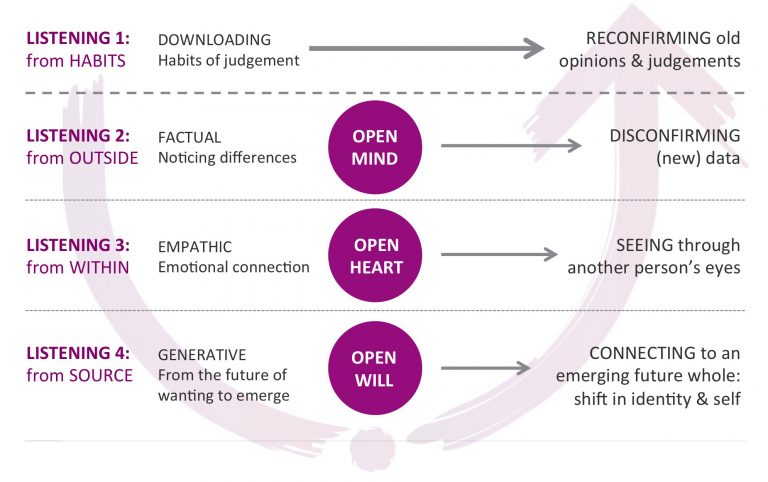Often in conversations we don’t really listen properly to what is being said.
Most people do not listen with the intent to understand; they listen with the intent to reply.” The 7 Habits of Highly Successful People, Steven Covey, 2004.
One of the main aims of the ‘WMTY?’ approach is to help us develop a greater desire to simply listen, to listen deeply and to understand. ‘WMTY?’ conversations provide an opportunity to stop and think a little more about how we are listening, who we are listening to and what we are doing as a result.
There are so many other things competing for our attention, most people have busy lives and work commitments take priority at times, that it can be difficult to find a space in our day to think about our priorities. Making space for listening to others can prove very challenging. However, deep listening can make an impact as a meaningful intervention on its own. How?
Benefits of active listening
As health and social care professionals we often feel we need to do something to help but often, we can be at a loss to know what to do. Sometimes this might cause us to avoid asking a question, or sometimes we might feel we need to do something, anything – and end up making things worse because we haven’t properly understood what mattered to the person.
Actively listening in a more careful way helps to generate connection and trust – a powerful ally to help generate high quality compassionate relationships focused on the things that really matter.
Being listened to also has many benefits for the person telling their story too. It can help to build self-esteem and confidence as well as generating insight and discovering new strengths. Sometimes it is only by telling our story that we realise how well we have coped and the resilience we have within us. So, it’s important to remember listening isn’t always about doing – often it’s just about listening and listening well.
Levels of Listening
The ‘levels of listening’ model set out below (Scharmer, 2007), can be a useful framework to hold in your mind as you listen to someone, whether in a conversation with someone you are supporting or caring for, with a colleague or even with loved ones at home.

These levels of listening are aimed at supporting you in two important ways:
To think more deeply about how well we listen to one another.
To listen in new and creative ways that foster meaningful, purposeful relationships between people and focusing on the things that really matter to them.
So, when you have your, ‘what matters to you?’ conversation, reflect and ask yourself: “what level am I listening at?
Reference
Ballatt, John & Campling, Penelope (2011) Intelligent Kindness: Reforming the Culture of Healthcare. RCPsych Publications
Covey, Stephen R. (2004) The 7 Habits of Highly Effective People: Restoring the Character Ethic. New York: Free Press
‘Addressing the Blind Spot of Our Time’ – an executive summary of the new book by Otto Scharmer Theory U: Leading from the Future as It Emerges (Cambridge, 2007).